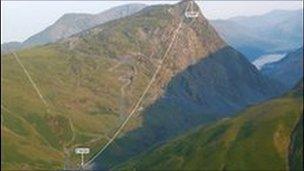Zip wire attraction plans withdrawn for Lake District
- Published

The proposed zip wire would have spanned the length of Fleetwith Pike
Controversial plans to build a mile-long zip wire on a Lake District mountain have been withdrawn.
The proposed Lancaster Aerial Flight at Honister Slate mine would have replicated a similar construction that existed there more than 80 years ago.
It was the brainchild of Mark Weir, who runs a slate mine at the top of the Honister Pass.
Mr Weir said he expected to submit another similar application in the new year.
He said English Nature and the National Park disagreed with some aspects of the original application.
He added: "I am working with them to get a course they are happy with."
He said there had also been some misunderstanding about where the pylon summit would be situated.
Friends of the Lake District had concerns with the original planning application because of the potential impact the wire would have on the landscape, and the type and level of activity it would bring to the Honister valley.
The charity said the wire would "fundamentally change the area", passing very close to walkers using the popular Wainwright route to Haystacks.
'Wrong place'
The charity was also concerned about the development generating additional traffic into the valley, where there is limited public transport.
Friends' planning officer Richard Pearse said: "This is just the wrong place for a new visitor attraction that would be aiming to attract large numbers of people.
"We are concerned not only about the impact of the development itself if it were approved, but also the precedent this would set for future development in the area.'
The plans involved a 2,126ft (648m) high zip wire cable running from the top of Fleetwith Pike down to the Honister Slate Mine Visitor Centre.
Plans for the attraction were due to go to the Lake District National Park Authority's planning committee on Wednesday 3 November.